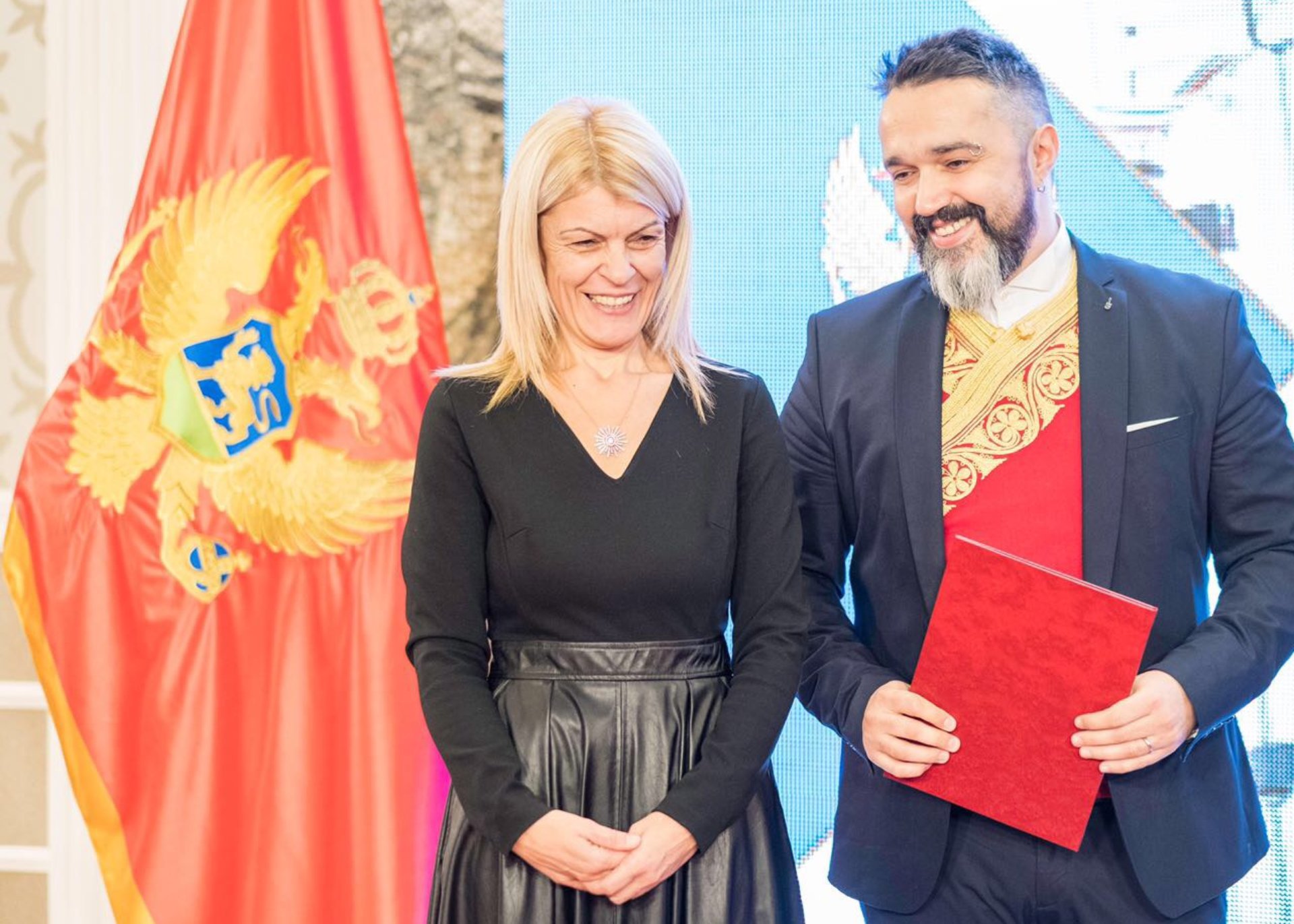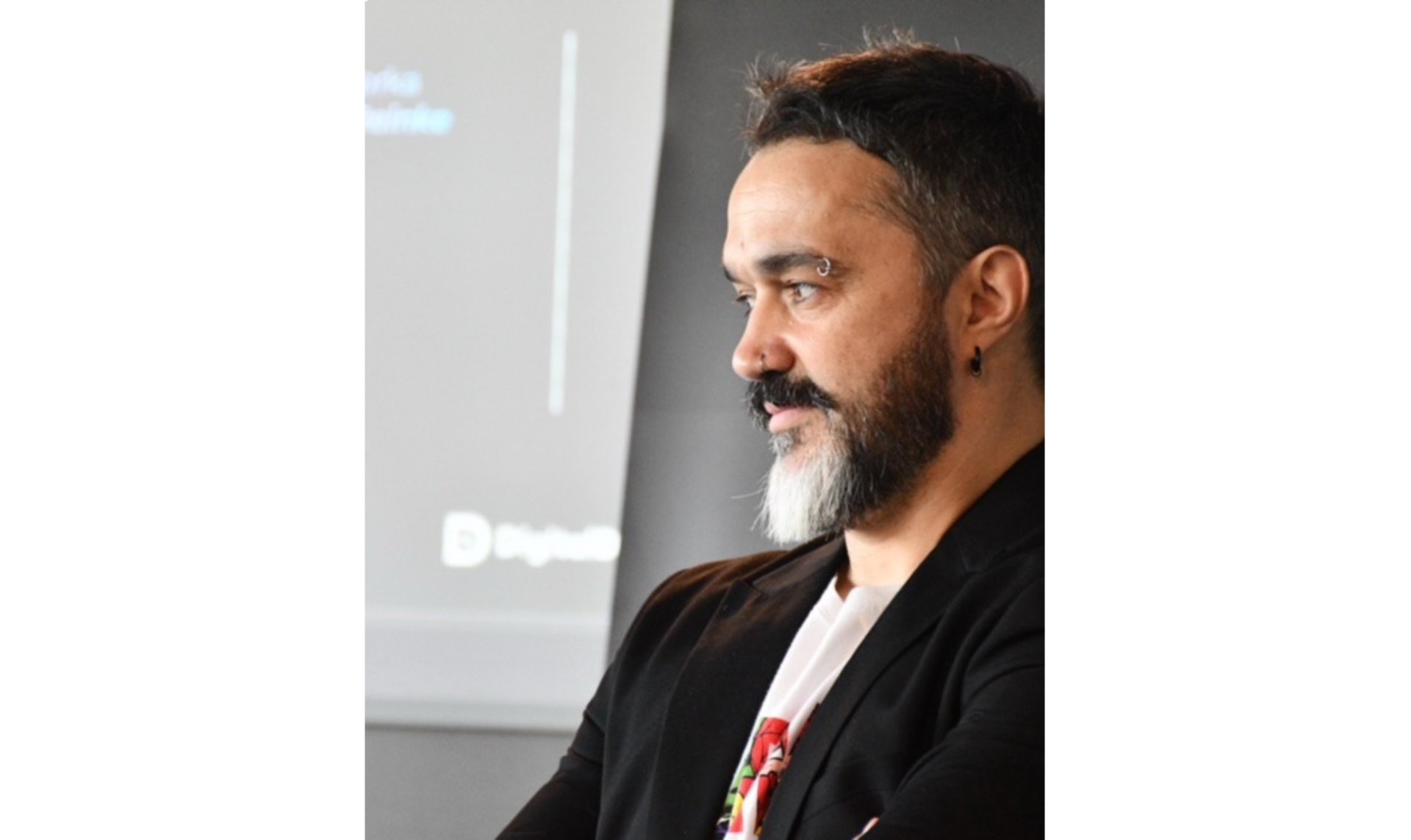Interview with Darko Ivanović
– Board Member of the “Digital Den” venture studio –
Darko Ivanović, board member of the of the startup hub “Digital Den”, was the interlocutor of “Diplomacy & Commerce Montenegro” magazine. After completing his professional development, Ivanović embarked on his journey in the field of mass communication in the USA, supported by a Fulbright Humphrey scholarship. Inspired by his experience in Phoenix (Arizona), where he founded his first startup “The Badger”, he decided to shift his focus to the startup ecosystem in Montenegro. Upon returning to his homeland, he and his partner laid the groundwork for new entrepreneurial ventures through the establishment of “Digital Den” – a venture studio aimed at catalyzing innovation in the Balkans. In the interview, Darko shared his valuable insights on the triumphs and trials encountered in establishing a regional startup ecosystem. He shed light on the pivotal advantages that “Digital Den” offers to startups and articulated an inspiring vision for the future of the Montenegrin economy, particularly within the realm of research and innovation.

Darko, in 2015, you went to Arizona, Phoenix, through the Fulbright Humprey scholarship to improve yourself in the media domain, more precisely, to further educate yourself in the field of mass communication. However, there you founded your first startup, “The Badger”, and things went in the direction of innovation and IT. You used your return to Montenegro to integrate yourself into a new ecosystem – startups and everything related. About three years ago, this led to the establishment of the venture studio “Digital Den”. What inspired you to focus on the startup ecosystem in Montenegro? What challenges did you face along the way?
After a quarter of a century in journalism, there was practically a turning point in my professional commitment. It was influenced by various circumstances, particularly my journey to the USA and the endeavor to transform an idea conceived in Montenegro with a few friends into a pioneering startup. Today, “The Badger” is launching the ultimate version of its hardware, complemented by a series of patents in the USA. Additionally, Montenegro honored me with the title of Innovator of the Year for this achievement. I have an aversion to awards and rewards generally but especially in the IT industry. IT is not a race or a competition, especially when compared to the expansive Western ecosystem. It’s akin to receiving an award for changing a tire on a car – neither the car nor the task is novel or requires exceptional skills. However, this award serves as a recognition of the perseverance and dedication that some may have dismissed as futile work. Nobody laughs today. Let’s say that accepting that award was my “malevolent” response to an environment that didn’t understand what I was trying to achieve. Startups, patents, crowdfunding, scaling, go-to-market strategy, and traction were distant and unfamiliar terms back then, often heard in movies or from local startup mentors preaching the “lean canvas” methodology. These mentors seemed more like bad actors selling knowledge they had only encountered through literature. With this, I partially address the challenges faced in establishing the “Digital Den”.
These “experts” and fancy administrators were a sweet, yet trivial challenge. Nenad Novović and I worked really hard, and today, we have an indication of regional and international success for one of the 4-5 startups from our portfolio, which includes almost 30 innovative companies. This stands as a remarkable example of success through hard work, and is a beacon especially for those startups who progress at a slower pace yet are driven by passionate and enthusiastic founders who are determined to overcome the challenges that come with climbing the mountain known as traction. My partner and I encountered numerous setbacks and disappointments in dealing with people, teams, and even those who sought to undermine the initiatives and institutions we were involved with. Both here and abroad. In 2024, there is less emphasis on vanity and more on work. Those “bad actors” I mentioned are gradually leaving the scene, making way for knowledgeable, original startupers, or determined entrepreneurs, hustlers.
Furthermore, thanks to the dedicated efforts of the visionary leaders at “Digital Den” and the invaluable support from the innovation directorate of the Ministry of Science, Education, and Innovation – we were advocating for the alignment of various regulations within the Ministry of Finance with the groundbreaking Law on Incentive Measures for the Advancement of Research and Innovation. This law, once dormant and mired in bureaucratic processes, has now facilitated the funding of numerous startups in Montenegro. This has not only piqued the interest of foreign investors but has also led to the establishment of the first entirely private fund dedicated to financing Balkan startups – the “Balkan Tech Fund”. I am privileged to serve as a co-founder alongside Nenad, and it’s noteworthy that it’s investment portfolio will solely consist of contributions from our esteemed partners in the USA. Practically, we are going to ensure that everything Montenegro has invested in innovations is returned many times over to this area through direct foreign investments. To summarize, these three years of challenges – felt like three centuries to us. And we have only just begun.
Digital Den is a venture studio based in Montenegro that serves as a catalyst for new entrepreneurial ventures in the Balkans. Can you provide specific examples of successful projects that have gone through your program? Also, what are the key advantages you offer to startups compared to other similar hubs?
I would like to explain in more detail how “Digital Den” is structured as a venture studio. We leverage the benefits of the aforementioned law to appeal to Montenegrin startups as well as startups from the surrounding region. To qualify for our program, startups are required to relocate their business operations and intellectual property to Montenegro, thereby becoming Montenegrin entities. The journey begins with the “Startup Readiness Program”, a collaborative effort with the Science and Technology Park and Gridt, a Netherlands-based company. Our meticulous selection process involves filtering through 30 startups, focusing on factors such as the compelling nature of the idea, its potential impact and the stage of development, whether ideation or prototyping. This discerning approach leads to the identification of 15 promising startups, which then proceed to formalize acceleration contracts with us. Following a series of online and live modules, we identify the top 7-10 startups to participate in the exclusive “Montenegrin Tech and Startup Bridge” program. This program, developed in partnership with the State Department, offers selected startups the opportunity to travel to the US for acceleration. During this program, participants will have first-hand access to successful startup environments, enabling them to refine their approach, present their products to potential investors, and network with future mentors and partners. Meanwhile, Digital Den is cooperating with startup founders to connect them with potential investors through the aforementioned Law. As a result of our efforts, we have successfully secured over 3 million euros in development funding for the startups in our portfolio. Furthermore, our program includes a “soft landing” initiative, which facilitates the establishment of two to three company branches in the USA annually. This comprehensive system is strategically designed, and we are optimistic about achieving our first successful exits in the near future.

So, this is how the magic happens: We add to the original Montenegrin startups those that we have made Montenegrin and send them to the USA so that, as Montenegrin companies, they can establish their subsidiaries there. For me, this is the most extraordinary form of patriotism that exists, and that is our singing-the-national-anthem-on-the-podium-while-the-flag-flutters feeling. We are immensely proud of the system we have built in just three years.
Today, Digital Den operates from multiple locations across the United States, including Phoenix, Denver, Portland, Chicago, New York and Austin. How is Digital Den’s collaboration with investors progressing in the United States? What were the primary challenges encountered during this venture, and what have been the outcomes of these endeavors?
Our acceleration program, established through a valued partnership with the US Government and facilitated by the US Embassy in Podgorica, has empowered us to cultivate a distinctive network of advisors, mentors, and partners in the United States. The invaluable asset of Digital Den lies within our Advisory Board, composed of individuals overflowing with expertise and accomplishment, yet exemplifying humility. Notably, they offer their expertise without financial compensation, driven by their passion to bolster the growth of the startup ecosystem in our captivating yet small nation. Having extended an invitation to Montenegro, we are honored to have witnessed their admiration for the beauty of our country, and we have endeavored to ensure they receive the warmest hospitality as hosts.
The journey was rife with challenges. The biggest one was that I was grappling with a microsystem that didn’t have financial potential. Still, it took a backseat to sheer talent and innovative ideas, which were very much present in this beautiful pile of stones. Then, as we delved deeper into collaboration with a remarkably advanced system, I found myself humbled by my lack of understanding of startup challenges, system dynamics, and effective solutions. However, as I set aside my ego, my repertoire of knowledge and skills began to flourish, giving rise to personal triumphs along the way. The fact that we did not stop at Digital Den, which became a brand in the region, but formed the “Balkan Tech Fund” with Peter Adams from Denver speaks not of omnipresent Montenegrin megalomania but of the potential of this area and our desire to complete the system and gain new knowledge in direct cooperation with some of the most experienced people in this industry.
The results involve constructing systems, relying on the expertise of foreign partners, and investing in nearly all of our startups.
You mentioned earlier that the Law on Incentive Measures for the Development of Research and Innovation, which allows startups to be funded by companies, has significantly improved the financial sustainability of startups in Montenegro. What is your vision for the future of the Montenegrin economy in the context of research and innovation? Additionally, how do you see the role of Digital Day in further positioning Montenegro on the regional, European, and global map in this sector?
The role of Digital Den in establishing it on the global stage is unparalleled and cannot be more proactive than it is. We are delighted to share with you exclusively that, following our success in the USA, we are embarking on the creation of the “Montenegrin tech & startup bridge EU”. This initiative will involve forging connections with tech ecosystems in France, Belgium, and the Netherlands, mirroring our successful collaborations in the US. Furthermore, in addition to our existing partnerships with regional incubators such as Founder Institute and NEST Macedonia for example, we are excited to announce the launch of the “PizzaPie” project by the end of 2024. This endeavor will establish micro hubs for developing Digital Den’s startup culture in Bar, Bijelo Polje, and Cetinje, reflecting our presence in various US cities. It is one thing to spread internationally, but the branched canopy must be nourished by the root.
Regarding my vision for the Montenegrin economy, I am confident that if all actors in the innovation community cooperate, the IT and innovation industry can be the driving fuel for the accelerated development of Montenegro, which is in the lobby of the EU. Relying solely on tourism and traditional services is not sufficient. It’s essential to foster a culture of innovation to propel us beyond mediocrity. At Digital Den, we believe that no challenge is insurmountable; there are only unskilled assailants. That is why we will work to stay – simply above.